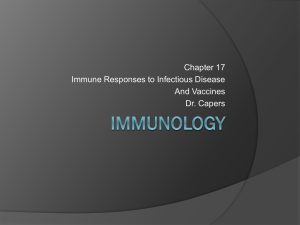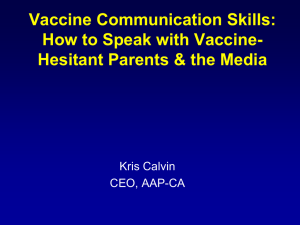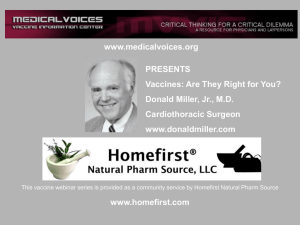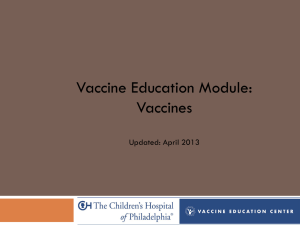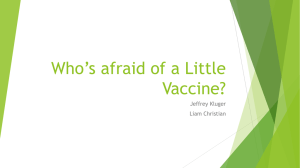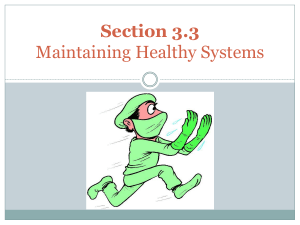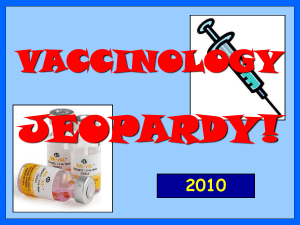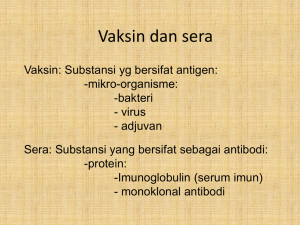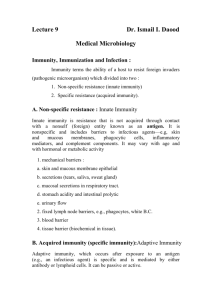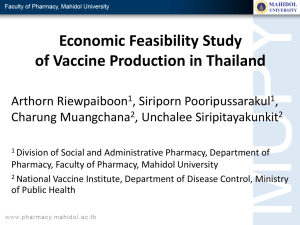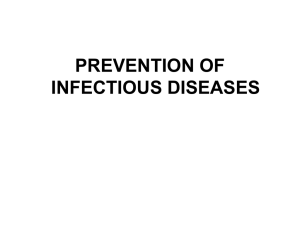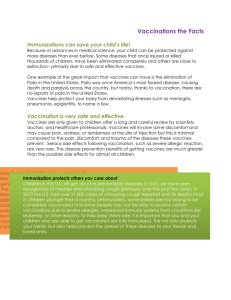Effects of Vaccines
advertisement
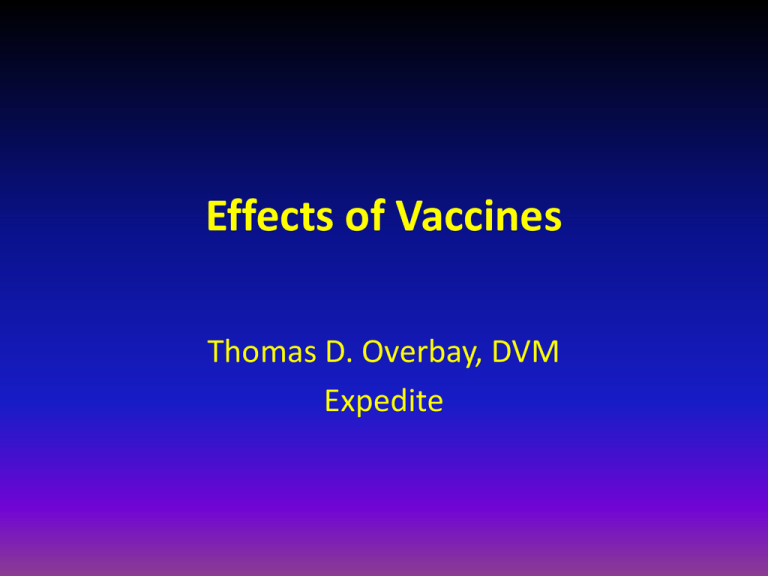
Effects of Vaccines Thomas D. Overbay, DVM Expedite Expedite • Animal Health Business Development Company • Focused on bringing new technology from conception to commercialization • Serving large, multinational companies as well as start-ups and public/private partnerships What are we going to talk about? • Vaccination • Vaccines • Adjuvants • Adverse Events “It is not the things I don’t know that bother me; it’s the things I think I know that turn out to be wrong that keep me up at night” The purpose of vaccination is to stimulate immunity against disease It is an active process that requires active participation by the calf and is not without some risk Health—Balance Between Resistance and Exposure Why Do We Vaccinate? • The only reason to vaccinate is to produce an economic benefit • Sickness and Death Loss • Production losses – Weight gains – Feed Efficiency – Interest costs • Reproductive efficiency • Colostral immunity What Vaccines Do Not Do? • Vaccines do not cause disease • Vaccines do not treat disease • Vaccines do not work immediately and may take multiple doses • Keep in mind that there is no immunity in any vaccine sold by any company—the immunity comes from the animal What Constitutes a Veterinary Vaccine • • • • Product Personnel Facility Subject to additional restriction by state or other such authority (Johnes vaccine) • All are approved by the USDA Veterinary Vaccine Categories by License • Fully Licensed • Conditionally Licensed • Autogenous Requirements of a Fully Licensed Veterinary Vaccine • • • • • Safety Purity Efficacy Potency Immunogenicity and antigen blocking Vaccine Components • Antigen (Ag) • Carrier / Vehicle • Adjuvant • Preservatives • Buffer Systems Autogenous Veterinary Vaccines • Approved in circumstances where a specific and immediate need exists • An approved veterinary vaccine is not effective in preventing the disease • An approved veterinary vaccine is not available to prevent the disease • Requires a specific diagnosis • Limited to use on the farm or premises of diagnosis • Requires regular isolation and update Types of Veterinary Vaccines • • • • • Viral Bacterial Protozoal Fungal Parasites Types of Veterinary Vaccines • • • • • • Whole killed organism Modified Live organism Live organism Subunit Recombinant DNA So How Do We Get Vaccines To Work?? Immunizing the Animal • Body must recognize the antigen as foreign • Immunization requires exposure to a defined quantity of antigen over a period of time • Adjuvants play a role in both antigen recognition and durability • Immunization is an active process and is not innocuous What About Adjuvants? Adjuvants • Adjuvant literally means “aid” • Serve to enhance the immune response after vaccination • Discovered “by accident” when animals with post-vaccinal abscesses were found to have higher titers • First adjuvants were inflammatory agents • Later Fruend’s Complete Adjuvant was introduced – Mineral oil – Water – Mycobacterium Adjuvant Categories • • • • • • • • • Aluminum salts Oil emulsions Polysaccharides Proteins Liposomes Carbohydrates Saponins Cytokines Bacterial derivatives Choice of Adjuvant • Not all antigens respond to adjuvants in the same manner • Base on understanding of the protective immune response to natural disease • Multivalent vaccines are evaluated in approval studies • Use of multiple vaccines at the same time is not evaluated • Constitute a risk:benefit decision • Benefits – Greater resistance for longer period – Vibrio vaccines as an example • Risks – Loss of productivity – Enhanced inflammation or reactivity – Greater incidence of adverse events Choice of Adjuvant Dependent upon: • Animal species • Specific pathogen • Vaccine antigen • Route of administration • Type of immunity needed Role of the Adjuvant • Adjuvants vary in their function • Mechanisms of action – – – – – Create inflammation at the site of injection Attract immune mediating cells to the site of injection Orient the antigen in a specific geometric orientation Influence the type of immune response Influence the degree of immune response Potential Adverse Events • • • • • • • Fever Lethargy Anorexia Arthritis Myalgia Allergy May be exacerbated by antigen combinations (gram negative bacteria) or stage of animal development (pubescent Holsteins) • Differentiate between reactions “from” vaccines versus those “to” a vaccine Strategies to Reduce Adverse Events • Time vaccines to periods of low stress • Design vaccine program to minimize simultaneous use of more “reactive” vaccines • Design strategic vaccination programs • Recognize breed tendencies toward reactive periods Effects of Vaccines Questions and Discussion
